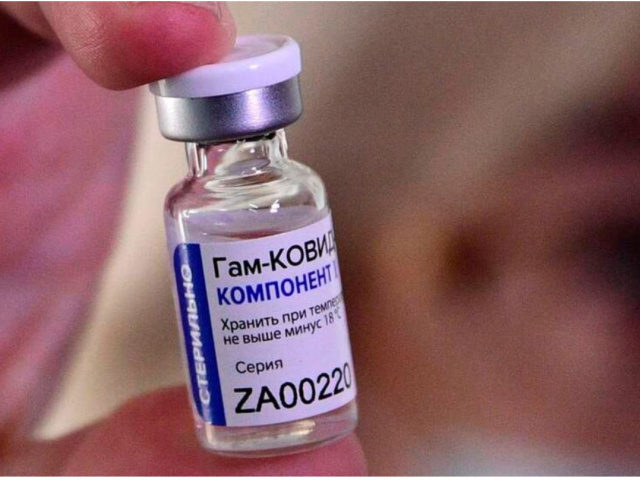The top regulatory health authority of Brazil banned Sputnik V, a Chinese coronavirus vaccine candidate developed by Russia, on Wednesday citing, among other flaws, that samples it studied contained a live virus that causes respiratory illness.
Brazil’s National Health Surveillance Agency (Anvisa) also asserted that Russia’s Gamaleya Institute, which produced the vaccine candidate, did not provide “consistent and reliable data” on the efficacy of Sputnik V.
Sputnik V was the first vaccine candidate for use against any coronavirus approved for widespread use by a large country. Russian leader Vladimir Putin personally approved the distribution of the vaccine candidate in the country in August 2020 despite it not yet having completed the typically necessary Phase III of clinical trials. Putin has no known medical background. While he claims to have been vaccinated against coronavirus, he has not disclosed if he chose Sputnik V or one of the several other products available that other nations approved after more rigorous clinical testing.
In an extensive statement to the public, Anvisa noted that it made its decision not to allow the distribution of Sputnik V in Brazil after deliberations with five different government agencies. At the top of the list of its concerns is evidence suggesting lapses in safety protocol at the manufacturing stage of the virus, meaning the design of the vaccine candidate may be functional but the doses as produced are too dangerous to use.
“Flaws in product development were identified in all stages of clinical studies (Phases I, II, and III),” Anvisa detailed. “There is also an absence or insufficiency of quality control, safety, and efficacy data.”
“One of the worrying facts regarding the evaluation of the data available so far is that the cells where the adenoviruses are produced for the development of the vaccine allow their replication,” it continued. “This can lead to infections in humans and can cause damage and death, especially in people with low immunity and respiratory problems, among other health problems.”
Adenovirus is a pathogen that causes respiratory infections but is unrelated to the Chinese coronavirus. It is one of several viruses that can cause symptoms akin to the common cold and typically does not pose a serious threat to the life of a healthy adult. The virus may, however, cause serious complications to someone who is immunocompromised or suffering from other health conditions.
Sputnik V works, according to the medical journal the Lancet, by using two types of adenoviruses — Ad26 and Ad5 — as vehicles to introduce Chinese coronavirus spike proteins into the body. The proteins are meant to trigger an immune response, creating antibodies without an actual coronavirus infection.
“The downside of recombinant adenovirus-based vaccines is that large doses are required, typically 1010 or 1011 particles, which makes large demands on the manufacturing and quantitation required for rollout on a global scale,” the Lancet adds. “Recombinant” refers to the introduction of coronavirus spike protein into a different pathogen.
For vaccines to use this technology to function safely, the adenovirus must be stripped of its ability to reproduce, otherwise, the patient contracts an adenovirus infection.
Anvisa added to its concerns about live adenovirus in Sputnik V that the studies meant to prove that this was not a concern were “inadequate … including with regard to the analysis of impurities and contaminating viruses during the manufacturing process, in addition to the lack of validation/qualification of quality control methods, among several other aspects.”
The full report also noted that Brazil sent inspectors to Russian manufacturing plants and found no evidence “the products are consistently manufactured and controlled.” It did not comment on Sputnik V doses manufactured in Brazil. Uniao Quimica, a Brazilian pharmaceutical company, signed a deal with the Gamaleya Institute to begin production of the product in January, according to Russian news agency TASS. The agreement was based on an assumption that Anvisa would approve the vaccine.
Anvisa experts and others from the Brazilian government expressed hope in the statement rejecting Sputnik V that the Gamaleya Institute would rectify the many problems detained in Anvisa’s report, potentially allowing the vaccine to be distributed in Brazil. Brasilia allowing the manufacture of Sputnik V in Brazil before its approval by its top regulatory body suggests that it expected Moscow to properly address any concern Anvisa may have eventually.
Anvisa’s statement was a response to dozens of Brazilian state governments requesting approval to import as many as 30 million doses of Sputnik V to their people. The federal government had requested another ten million. Sputnik V requires two doses to reach its maximum potential.
According to Agence France-Presse (AFP), the Gamaleya Institute has denied that quality control or manufacturing problems exist with its product. The denial by Brazil has also not deterred other nations from approving the vaccine candidate. India announced this week, for example, it would begin administering Sputnik V nationally on May 1, joining a homemade vaccine candidate known as Covaxin and a vaccine candidate by European company AstraZeneca known locally as Covishield.

COMMENTS
Please let us know if you're having issues with commenting.